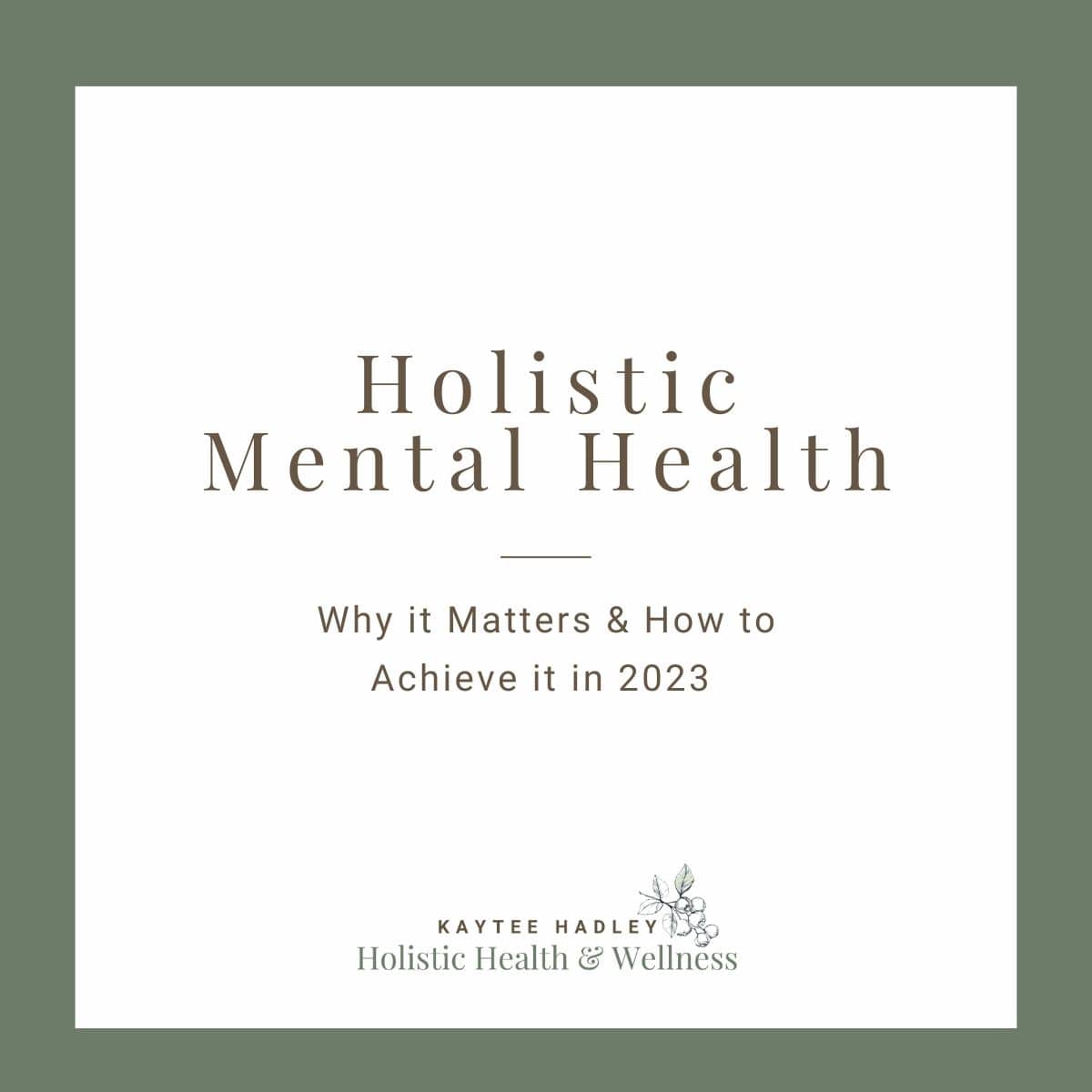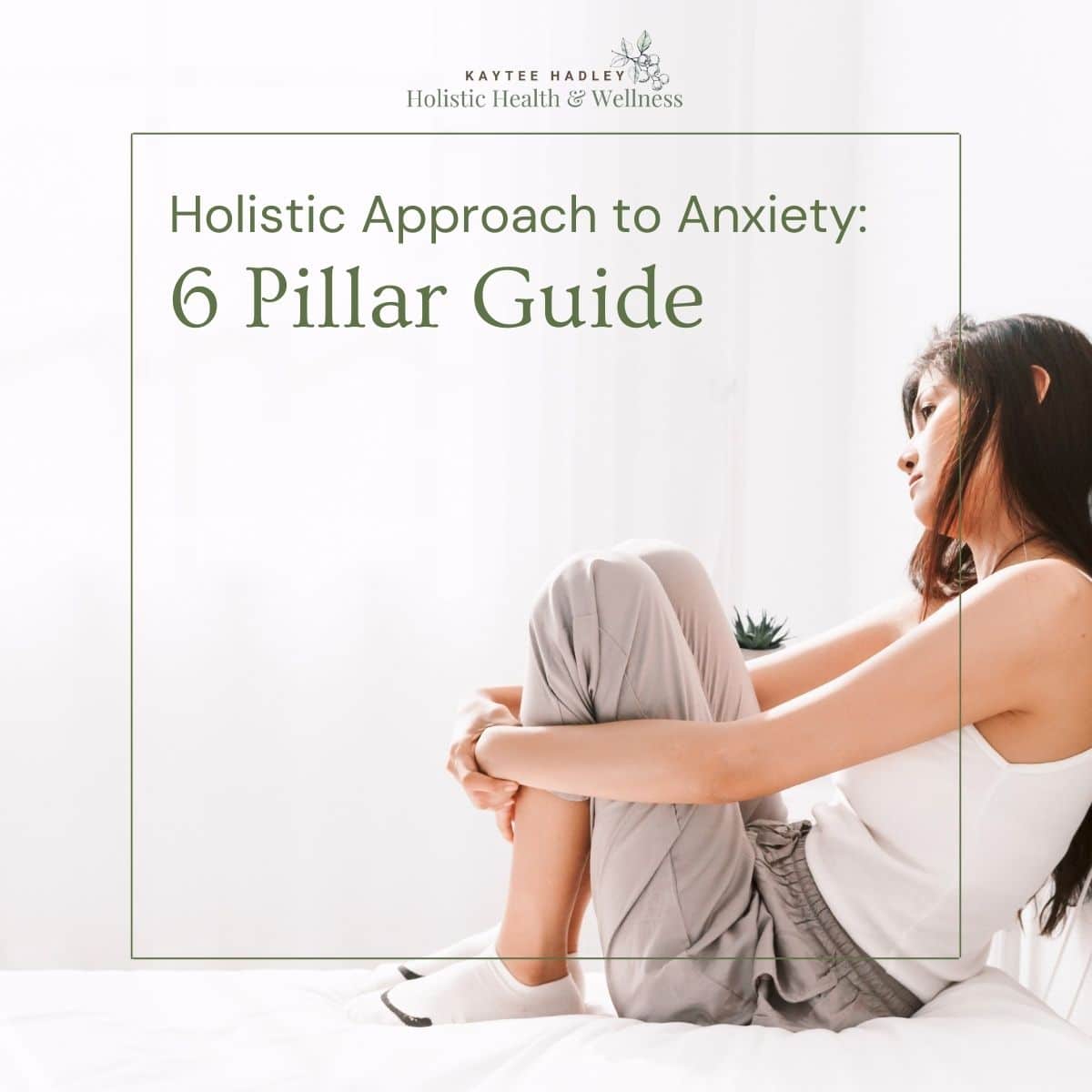This post is coauthored by Ahmicqui Bribiescas-Page, a former intern at Holistic Health and Wellness.
Do you struggle to get a good night’s sleep because of racing thoughts or anxiety?
Have you ever wondered if there’s more you can do to fall asleep and stay asleep easier?
Well, there is!
Because anxiety and sleep are connected, both mentally and physically, natural methods can support both at the same time.
Certain vitamins and minerals have been shown to reduce symptoms of anxiety and promote restful sleep, and the good news is that you can get them from foods you know and love!
Interested to know which ones? Continue reading to find out!
Want to save this article to reference later? Click here to get a PDF copy delivered to your inbox.
Anxiety
Table of Contents
What It Is
Anxiety is a mental and physical response to a situation that can feel like overwhelming uneasiness, dread, or tension. It can include physical changes, such as sweating, trembling, dizziness, and increased blood pressure.
While some levels of anxiety can be a healthy response to certain stressful situations, having anxiety all the time can have a negative impact on your health and make it hard to do daily tasks.
Causes
Anxiety can be caused and influenced by many factors, including:
- Genetics
- Brain biology
- Physical health
- Mental health
- Environmental factors
While we cannot change our genetics, we can control many aspects of our environment, health, and lifestyle that impacts the development of anxiety.
Nutrition is one of these powerful influences that can change the expression of certain genes in the body and impact physical and mental health.
Anxiety and Sleep
Relationship Between Anxiety and Sleep
Anxiety and its many symptoms, such as restlessness and tension, can negatively impact a person’s quality of sleep and even lead to sleep deprivation. Not enough (or poor quality) sleep can then worsen anxiety symptoms in return.
This creates a vicious cycle of anxiety and poor sleep that make each other worse.
Breaking this cycle by reducing anxiety and/or improving your quality of sleep is essential for optimal physical and mental health.
How Can Vitamins and Minerals Help with Anxiety and Sleep?
Vitamins and minerals are necessary for all functions in the body. They help us heal, produce energy, regulate emotions, and keep our immune system strong, to name a few.
Here are four reasons why incorporating foods rich in important vitamins and minerals can improve anxiety and sleep:
- During times of stress, the body uses more nutrients which can lead to low levels in the body and increase the need for these vitamins and minerals.
- Low levels of certain nutrients in the body can exacerbate anxiety symptoms and cause sleeping difficulties.
- Antioxidants from certain vitamins can help to prevent and repair the oxidative stress that occurs during times of stress caused by anxiety or poor sleep.
- Having healthy levels of certain vitamins and minerals can help to reduce anxiety and improve sleep quality.
Vitamins and Minerals for Anxiety and Sleep
Many vitamins and minerals are important for sleep or anxiety, but these five have been shown to be essential for both:
Including foods high in these five vitamins and minerals, can help the body and brain in the ways listed above and potentially improve anxiety and sleep.
Save this graphic below to remember which foods are high in the five vitamins and minerals for anxiety and sleep.
Food vs Supplements
Food-First Approach
Food should be the first and main source of essential vitamins and minerals for anxiety and sleep (as well as other health benefits).
This food-first approach involves eating a variety of plant foods such as fruits, vegetables, whole grains, legumes, nuts, and seeds.
Eating an assortment of colorful, whole foods has benefits for the body and brain that supplements alone do not provide. For example, the higher intake of fiber, phytonutrients, and water that come from plants are beneficial for the gut and brain.
Role of Supplements
While a food-first approach is key, supplements can play a role when they are used therapeutically under a healthcare professional’s guidance.
Supplements can be used in two main ways:
1. To help meet the recommended daily levels for vitamins and minerals
2. Therapeutically, to increase low levels in the body
While it is possible for some people to get all the necessary vitamins and minerals from foods, it can be difficult depending on a person’s food access, nutrition knowledge, and many other environmental circumstances.
Therefore, supplements can be beneficial for filling in the nutritional gaps.
For example, a Vitamin B-12 supplement may be beneficial for vegans and vegetarians since the vitamin is found primarily in animal-based foods.
Supplements can also play a therapeutic role by increasing low level of certain vitamins and minerals in the body that may have occurred due to higher demands or low intake over a long period of time.
Work with your healthcare provider to test these levels, develop a personalized protocol, and recommended specific products. This is important because various supplements can interact with each other as well as medications and may be dangerous if you have certain medical conditions.
We Can Help
Checking your vitamin and mineral levels can help to identify the root causes of your anxiety and poor sleep so you don’t have to guess. From there, you can take a therapeutic approach to improve these levels and support your mental and physical health.
At Holistic Health and Wellness, we work with you to identify and correct nutrient insufficiencies. We also support you in addressing other lifestyle factors which may be contributing to your anxiety and sleeping difficulties.
Schedule your free discovery call with functional medicine dietitian Kaytee Hadley to see if Holistic Health and Wellness is a beneficial addition to your healthcare team.
Takeaways
Anxiety is the body’s response to stress which is influenced by genetics, biology, and environmental factors.
Chronic anxiety can cause sleeping difficulties which can worsen anxiety, creating a vicious cycle.
Certain foods have beneficial vitamins and minerals for anxiety and sleep, including magnesium, selenium, B vitamins, vitamins D and C.
Save the infographic provided for a reference of which foods are high in these nutrients.
A food-first approach is the best way to get these nutrients daily. Incorporating a variety of plant foods including fruits, vegetables, legumes, nuts, seeds, and whole grains is key.
Supplements can be used therapeutically but should be done under the supervision of a healthcare provider.
At Holistic Health and Wellness, we can help you identify your body’s specific nutrient needs and provide you with nutrition and lifestyle support to improve anxiety and sleep. Schedule a free discovery to see if we are a good fit for you.
For more information on a holistic approach to anxiety, check out this blog post!
Disclaimer: The information provided on this website is for educational purposes only and is not intended to diagnose or treat any disease. Please do not apply any of this information without first speaking with your doctor.
Ahmicqui Bribiescas-Page grew up in the small town of Big Bear City, California, in the San Bernardino Mountains. She attended California State University, Fullerton, and obtained a Bachelor’s Degree in Anthropology. After six years of working different jobs, she realized the importance of food, nutrition, and culture and wanted to become a Registered Dietitian. She is currently a Master’s student in the Nutrition, Healthspan, and Longevity program at the University of Southern California.

Kaytee Hadley MSc RDN IFMCP CPT is a functional medicine dietitian, holistic health coach, and certified personal trainer with a BA in Psychology, MSc in Nutrition, and Institute of Functional Medicine Certified Practitioner. She founded Holistic Health and Wellness to support folks with IBS and chronic GI symptoms who have been let down by the conventional care model to find and address the root causes of their symptoms naturally so they can be symptom free and thrive!


